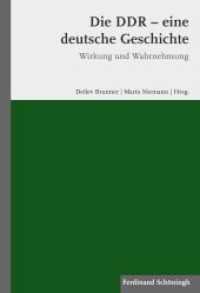Full Description
The essays selected for this volume demonstrate the importance of law - conceptually, normatively and practically - to a proper understanding of Hannah Arendt's work. Though Arendt herself was not a lawyer, and lacked any legal training, it is remarkable that in each of her guises law plays an often subtle, at times idiosyncratic, but unavoidably vital role. For example, as a journalist, confronting the evil of Adolf Eichmann; or as an essayist, engaged with emerging democracies in the East or their unravelling in the West; or as a political thinker concerned to celebrate and secure the conditions for political action; or as a philosopher, reflecting on man's capacity for judgement. Although Arendt herself never wrote systematically about law her rich insights in this field have been studied closely by scholars and this collection marks the first attempt to gather that work, and to understand it thematically. In so doing, the editors seek to open a dual dialogue: inviting Arendt scholars to uncover what Arendt had to say about law, and legal scholars to evaluate her contribution to the field of law.
Contents
Arendt and Law
Edited by
Marco Goldoni and Christopher McCorkindale
Part I: Concepts of law in Arendt's political thought
1. Hans Lindahl, 'Give and take: Arendt and the nomos of political community' (2006) 32(2) Philosophy and Social Criticism pp.881 - 901
2. Christian Volk, 'From nomos to lex: Hannah Arendt on law, politics, and order' (2010) 23(4) Leiden Journal of International Law pp.759 - 779
3. Massimo La Torre, 'Hannah Arendt and the Concept of Law. Against the Tradition' (2013) 99(3) Archiv fuer Rechts und Sozialphilosphie pp.400-416.
4. Jan Klabbers, 'Possible Islands of Predictability: The Legal Thought of Hannah Arendt' (2007) 20(1) Leiden Journal of International Law pp.1-23.
5. Peg Birmingham, 'On Violence, Politics, and the Law' (2010) 24(1) Journal of Speculative Philosophy pp.1-20
Part II: Constitution making and the riddle of foundation
6. Jeremy Waldron, 'Arendt's constitutional politics', in Dana Villa (ed.), The Cambridge Companion to Hannah Arendt (CUP, 2000), Ch.10, pp.201-219
7. Robert P. Burns, 'Arendt's Constitutional Thought', in James W. Bernauer (ed.), Amor Mundi: Explorations in the Faith and Thought of Hannah Arendt (Martinus Nijhoff, 1987), pp.157-185
8. Jason Frank, Constituent Moments: Enacting the People in Post-revolutionary America (Duke University Press, 2010), Ch.1, 'Revolutions and Reiteration: Hannah Arendt's Critique of Constituent Power', pp.41-66
9. William E. Scheuerman, 'Revolutions and Constitutions: Hannah Arendt's Challenge to Carl Schmitt' (1997) 10 Canadian Journal of Law and Jurisprudence pp.141-162
10. Andreas Kalyvas, 'The Republic of Councils' (ch.9), Democracy and the Politics of the Extraordinary (CUP, 2009), pp.254-291
11. Douglas Klusmeyer, 'Hannah Arendt's Case for Federalism' (2010) 40(1) Publius pp.31-58.
Part III: The politics of international law
12. Andrew Arato and Jean Cohen, 'Banishing the Sovereign: Internal and External Sovereignty in Arendt', (2009) 16(2) Constellations pp.307-330
13. Hauke Brunkhorst, 'Reluctant democratic egalitarianism: Hannah Arendt's idea of a revolutionary foundation of the modern nation state and international law' (2008) 15(2) Ethical Perspectives pp.149-167
14. Susan Marks, 'Law and the Production of Superfluity' (2011) 2(1) Transnational Legal Theory pp.1-24
15. David Luban, 'Hannah Arendt as a Theorist of International Criminal Law' (2011) 11 International Criminal Law Review pp.621-641
16. Leora Bilsky, 'The Eichmann Trial and the Legacy of Jurisdiction', in Seyla Benhabib et al (eds.), Politics in Dark Times: Encounters with Hannah Arendt (CUP, 2010), Ch.8, pp. 198-218
17. Lida Maxwell, 'Towards an agonistic understanding of law: Law and politics in Hannah Arendt's Eichmann in Jerusalem (2012) 11(1) Contemporary Political Theory pp.88-108
Part IV: The Right to Have Rights
18. Seyla Benhabib, '"The right to have rights": Hannah Arendt on the contradictions of the nation-state' The Rights of Others: Aliens, Residents and Citizens pp. 49-70 (CUP, 2004),
19. Frank I. Michelman, 'Parsing "A Right to Have Rights"' (1996) 3(2) Constellations pp.200-208
20. Jean L. Cohen, 'Rights, Citizenship, and the Modern Form of the Social: Dilemmas of Arendtian Republicansim' (1996) 3(2) Constellations pp.164-189
21. James D. Ingram, 'What Is a "Right to Have Rights"? Three Images of the Politics of Human Rights', (2008) 102(4) American Political Science Review pp.401-416
22. Jacques Rancière, 'Who is the Subject of the Rights of Man' (2004) 103(2-3) South Atlantic Quarterly pp.297-310
23. Andrew Schaap, 'Enacting the right to have rights: Jacques Rancière's critique of Hannah Arendt' (2011) 10(1) European Journal of Political Theory pp.22-45







